Lifelong Learning in Public Libraries
Principles, Programs, and People
Donna L. Gilton
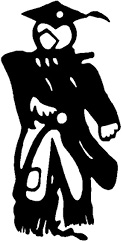
THE SCARECROW PRESS, INC.
Lanham Toronto Plymouth, UK
2012
Published by Scarecrow Press, Inc.
A wholly owned subsidiary of The Rowman & Littlefield Publishing Group, Inc.
4501 Forbes Boulevard, Suite 200, Lanham, Maryland 20706
http://www.scarecrowpress.com
10 Thornbury Road, Plymouth PL6 7PY, United Kingdom
Copyright 2012 by Donna L. Gilton
All rights reserved . No part of this book may be reproduced in any form or by any electronic or mechanical means, including information storage and retrieval systems, without written permission from the publisher, except by a reviewer who may quote passages in a review.
British Library Cataloguing in Publication Information Available
Library of Congress Cataloging-in-Publication Data
Gilton, Donna L.
Lifelong learning in public libraries : principles, programs, and people/
Donna L. Gilton.
pages cm
Includes bibliographical references and index.
ISBN 978-0-8108-8356-7 (pbk.) ISBN 978-0-8108-8357-4 (ebook)
1. Libraries and continuing educationUnited States. 2. Information
literacyStudy and teachingUnited States. 3. Public librariesAims and
objectives. 4. Libraries and education. I. Title.
Z718.8.G55 2012
025.5dc23
2011044181
 The paper used in this publication meets the minimum requirements of American National Standard for Information SciencesPermanence of Paper for Printed Library Materials, ANSI/NISO Z39.48-1992.
The paper used in this publication meets the minimum requirements of American National Standard for Information SciencesPermanence of Paper for Printed Library Materials, ANSI/NISO Z39.48-1992.
Printed in the United States of America
To the memory of the public librarian who taught me, Helen Cammett, Childrens Librarian, Shute Branch, Lynn, Massachusetts, Public Library, 19541981.
Dedicated to my mother, Hattie Franklin Gilton.
To the memory of Norman Horrocks, who mentored me in publishing.
To the memory of E. J. Josey, The Father of Modern Black Librarianship, who promoted librarianship as a field of mission in preserving our democracy.
With appreciation to Nadine Mitchell, Director, Lynn Public Library.
The World of Information Literacy Instruction (ILI)
Public librarians have always instructed their patrons on the use of information, but their style is so informal, personal, indirect, and basic and so tied to guidance, it is not always recognized as instruction, either by public librarians or by their peers in academic settings. It is a thesis of this book that public librarians should teach more, but that this instruction should be on their own terms, taking their own histories, philosophies, traditions, and characteristics into account.
Public libraries exist to strengthen democracy by promoting an informed citizenry. By combining their own traditions with more elements of Information Literacy Instruction (ILI), public librarians can contribute to the information enfranchisement of their patrons, further fulfilling many of their traditional goals and purposes.
This book will give an overview of the ILI field for public librarians; describe all aspects of ILI; discuss many ways that ILI can be used in public libraries; consider the history, philosophy, and traditions of public library service; establish a framework for planning instructional programs, activities, and outreach from public libraries; and describe and summarize needs of diverse users and developmental theories. It will not attempt to give detailed information on topics already well discussed elsewhere but will give brief summaries and refer readers to other sources of information.
Several articles have mentioned the need for public librarians to receive much more training on how to instruct. The present situation is very similar to trends affecting academic librarians before the Association of College and Research Libraries (ACRL) created the Institute of Information Literacy (IIL). It is a goal of this book to give public librarians an overview of this complex field and to enable them to pursue goals and strategies useful to them. It is hoped that this book will act as a portable IIL for this group, along with a forthcoming book, Creating and Promoting Lifelong Learning in Public Libraries: Tools and Tips for Practitioners , which will elaborate much more on specific instructional practices. These works will not only demonstrate the wide variety of instructional activities already performed by public librarians and what makes many of these activities unique but will also show that there are many ways of viewing, designing, and evaluating instructional programs.
Information enfranchisement represents a paradigm shift. It is no longer just a goal in itself but a means to an even nobler endan informed citizenry, which has long been a traditional aim of public librarians. Promoting information enfranchisement for all people strengthens our democracy, promoting social capital, social inclusiveness, and community building. This attitude will also encourage the survival of the concept of the common good as well as help public librarians to deal with challenges from the information industry and the private sector. The research reported here will probably raise more questions than answers, encouraging the creative research and work of both library scholars and professionals.
This chapter will define and describe Information Literacy Instruction, elaborate on the history of the movement in all kinds of library settings, and mention unique aspects of public libraries and their instructional activities. Chapter 2 will illustrate current developments in public library instruction as well as the state of the literature on this topic.
What Is Information Literacy Instruction?
Information Enfranchisement = Public Libraries + Information Literacy Instruction
Most definitions of information literacy focus on the characteristics of information literate individuals. Paul Zurowskis original definition of such a person is anyone who uses a wide variety of information sources to solve work-related and other daily problems. Patricia Breivik, Carol C. Kuhlthau, Hannelore Rader, Christina S. Doyle, Christine Bruce, and other experts on ILI mention many other traits of information literate people, including the ability to define their information needs, their knowledge of a variety of information sources and information-seeking techniques, patience, flexibility, attention to detail, and the use of critical thinking to evaluate materials. Michael Eisenberg and Bob Berkowitz as well as American Library Association (ALA) organizations like ACRL or the American Association of School Librarians (AASL) have set many criteria to determine who is information literate. According to the ALA Presidential Committee on Information Literacy, a person knowledgeable in ILI is an individual with the ability to recognize an information need and can locate, evaluate and use that information effectively. People who know how to learn.
A definition of library instruction or user education that is very useful for public libraries is the following: activities such as providing library tours; delivering classroom lectures, presentations, or demonstrations on information gathering skills and resources; developing and teaching credit and noncredit library courses; co-teaching or providing course integrated library instruction; developing print, media, and multimedia library instructional materials; and even creating and implementing library signage systems. Other definitions of information literacy can be found in works by Barbara Humes, Robin Angeley and Jeff Purdue, Lori Arp, Shirley Behrens, Loanne Snavely and Natasha Cooper, and Joanna Burkhardt, Mary C. MacDonald, and Andree Rathmacher.

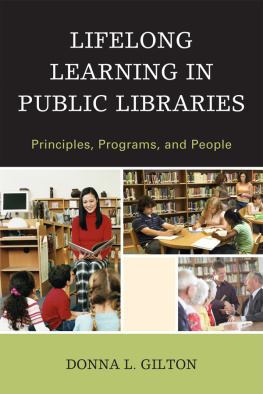
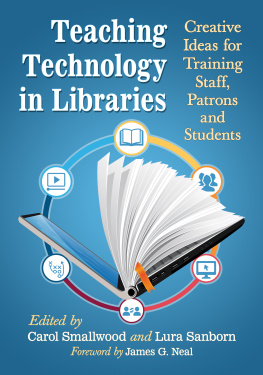
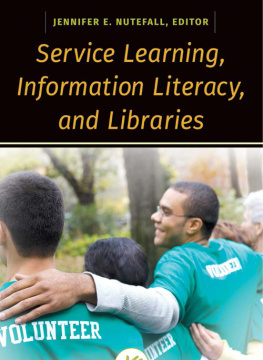
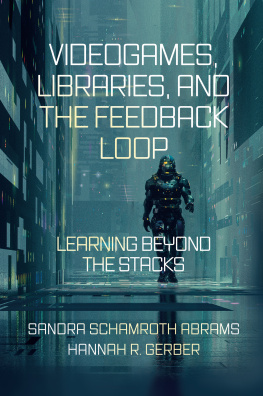

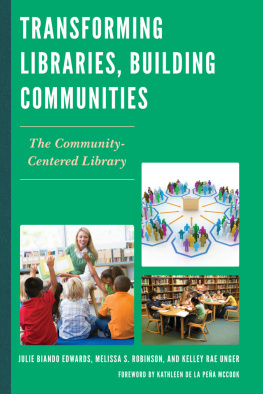

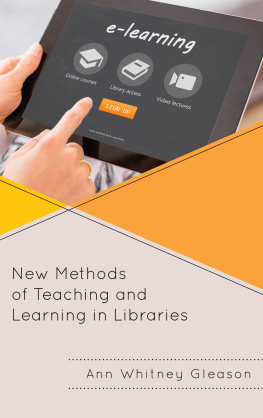
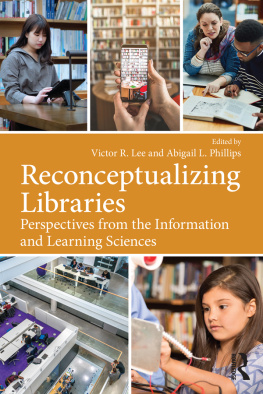

 The paper used in this publication meets the minimum requirements of American National Standard for Information SciencesPermanence of Paper for Printed Library Materials, ANSI/NISO Z39.48-1992.
The paper used in this publication meets the minimum requirements of American National Standard for Information SciencesPermanence of Paper for Printed Library Materials, ANSI/NISO Z39.48-1992.